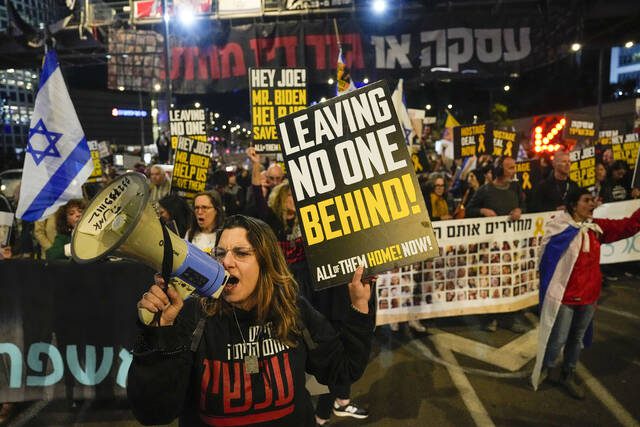In Jerusalem, the relatives of hostages held in Gaza since Oct. 7 are feeling increasingly hopeless, with one brother considering suicide, a sister no longer going to school, and a father hardly speaking. They were hoping for an agreement to bring some hostages home by the start of Ramadan, but that did not happen.
The families were hopeful for a cease-fire deal to bring their loved ones home at the beginning of Ramadan, the Muslim holy month that started on Monday. However, that informal deadline passed without any agreement.
For many hostages’ families, Israeli Prime Minister Benjamin Netanyahu’s promise of “total victory” in the war against Hamas now seems empty after five emotionally exhausting months.
Sharon Kalderon, whose brother-in-law Ofer is still in captivity, expressed the families' frustration with the uncertainty of the situation and the lack of information about their loved ones.
Hamas-led militants entered southern Israel on Oct. 7, resulting in the deaths of around 1,200 people, mostly civilians, and the capture of about 250 hostages. Since then, Israel’s offensive has led to the deaths of more than 31,000 Palestinians, according to Gaza health officials, and pushed hundreds of thousands to the brink of starvation.
During a November cease-fire, around 120 hostages were released, but efforts to bring back the remaining hostages, at least 34 of whom are dead, have become the focus for the families.
Some families are actively advocating for the release of the hostages through various activities, while others are quietly suffering.
However, some families are silently enduring their pain.
Ricardo Grichener, the uncle of 22-year-old hostage Omer Wenkert, reflected on how some families are actively seeking help and making noise, while others are struggling silently.
Following the destruction of their home in Kibbutz Nir Oz on Oct. 7, Sharon and Nissan Kalderon have been staying in an apartment in the Israeli city of Ramat Gan, with Ofer, Nissan’s only brother, still in captivity.
Nissan has recently had thoughts of suicide.
Nissan said, “This situation is very difficult. I can’t sleep, I can’t eat, I'm not working. I feel like I'm losing my mind. It’s too much.”
Sharon shared her concerns about Nissan's well-being when he goes out to the balcony.
International mediators were hopeful about reaching a pre-Ramadan deal, but Hamas and Israel could not agree on a longer-term end to the fighting, despite discussions about a six-week cease-fire, release of hostages and prisoners, and entry of humanitarian aid into Gaza.
“We do not anticipate a possibility for an agreement unless (U.S. President Joe) Biden performs an extraordinary act. We do not perceive any solution. We do not see any explanation for why Hamas would be willing to change. They do not benefit,” Grichener stated. “We are urging the (Israeli) government, but I believe they have already made mistakes.”
His nephew, Omer, who is being held captive, requires medication for his digestive illness. His family is uncertain whether the medical assistance for hostages that entered Gaza in January reached him.
Discussions between the families and war cabinet officials are ongoing, but families feel unable to influence the course of negotiations. Many have not received any official updates on the condition of their loved ones, instead holding on to information conveyed by hostages released in November.



